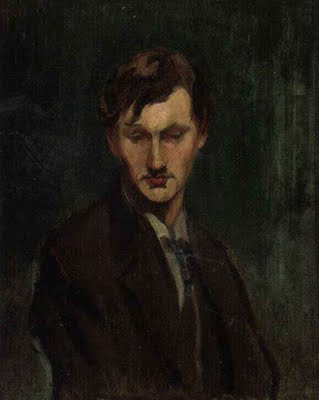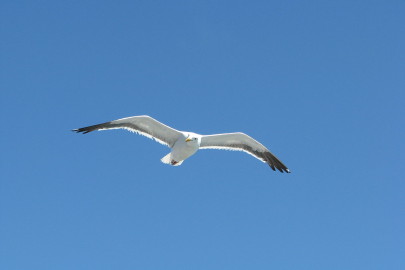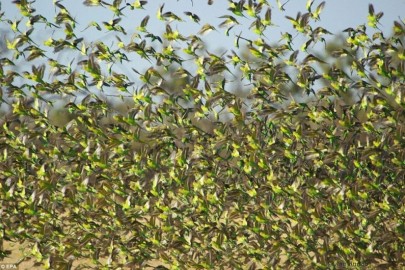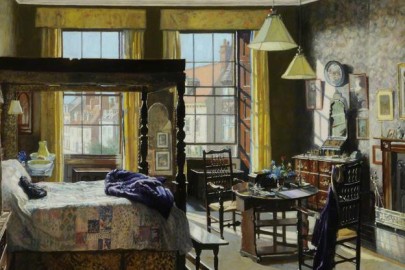Nige looks at the strange legacy of Lionel Johnson’s poem ‘Dark Angel’…
Born on this day in 1867 was Lionel Pigot Johnson, archetypal minor poet of the English Decadence (along with Ernest Dowson, who at least contributed two film titles, ‘Days of Wine and Roses’ and ‘Gone with the Wind’, to posterity).
Tormented homosexual, convert to the Church of Rome, physically frail, a short-lived alcoholic (who according to one account died after a fall from a bar stool) – poor Johnson had it all. His entry in the Catholic Encyclopaedia is a wonderful exercise in making the best of the material. (Note the beautifully placed ‘He never married’.) Johnson’s ‘singularly ripe’ study of Hardy sounds intriguing, as does his insistence on praying for his friends, ‘absent or present’. His lyrics ‘perhaps have in them something taxing’ – well, indeed. Here is the most famous of them – Dark Angel – and there are no prizes for spotting the subtext…
Dark Angel, with thine aching lust
To rid the world of penitence:
Malicious Angel, who still dost
My soul such subtile violence!
Because of thee, no thought, no thing,
Abides for me undesecrate:
Dark Angel, ever on the wing,
Who never reachest me too late!
When music sounds, then changest thou
Its silvery to a sultry fire:
Nor will thine envious heart allow
Delight untortured by desire.
Through thee, the gracious Muses turn,
To Furies, O mine Enemy!
And all the things of beauty burn
With flames of evil ecstasy.
Because of thee, the land of dreams
Becomes a gathering place of fears:
Until tormented slumber seems
One vehemence of useless tears.
When sunlight glows upon the flowers,
Or ripples down the dancing sea:
Thou, with thy troop of passionate powers,
Beleaguerest, bewilderest, me.
Within the breath of autumn woods,
Within the winter silences:
Thy venomous spirit stirs and broods,
O Master of impieties!
The ardour of red flame is thine,
And thine the steely soul of ice:
Thou poisonest the fair design
Of nature, with unfair device.
Apples of ashes, golden bright;
Waters of bitterness, how sweet!
O banquet of a foul delight,
Prepared by thee, dark Paraclete!
Thou art the whisper in the gloom,
The hinting tone, the haunting laugh:
Thou art the adorner of my tomb,
The minstrel of mine epitaph.
I fight thee, in the Holy Name!
Yet, what thou dost, is what God saith:
Tempter! should I escape thy flame,
Thou wilt have helped my soul from Death:
The second Death, that never dies,
That cannot die, when time is dead:
Live Death, wherein the lost soul cries,
Eternally uncomforted.
Dark Angel, with thine aching lust!
Of two defeats, of two despairs:
Less dread, a change to drifting dust,
Than thine eternity of cares.
Do what thou wilt, thou shalt not so,
Dark Angel! triumph over me:
Lonely, unto the Lone I go;
Divine, to the Divinity.
Poor Johnson. The ultimate indignity is that he lives on in the curious world of computer gaming. The poem above was one of the inspirations for the ‘Dark Angels’ chapter of the Space Marines in the Warhammer 40,000 fictional universe. I learn from Wikipedia that “The Dark Angels’ combat doctrine is centred around a tactically versatile force favouring the use of heavy plasma-based weapons”. Their ‘Primarch’ is called Lion El’Johnson.
Oh dear.












How could you insinuate that there’s anything vaguely homoerotic about spotty teenage boys huddling together in darkened rooms to play computer games where the lead characters are massively muscled supermen with enormous guns full of exploding plasma?
Well, quite!
Yeats’s picture of Johnson in Autobiographies is not unsympathetic, but at the same time is devastating. (Not unlike some others, but quite unlike his picture of George Moore, which leaves out the sympathy.) He mentions the drinking, and also shows Johnson as unable to distinguish conversations that happened and those that he made up.
“unable to distinguish conversations that happened and those that he made up”… We’ve all been there.
As I said to Rowan Williams this morning.
As a papist, Johnson invented conversations with Cardinal Newman, but you have the underlying notion correct.